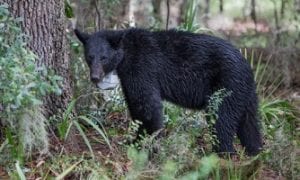UCF Bear Brigade
 The UCF Bear Brigade, a new pilot educational program to teach ecological concepts to fourth- and fifth-grade students, will visit six Orange and Seminole County elementary schools by the end of this month to foster a greater interest in the subject at an early age.
The UCF Bear Brigade, a new pilot educational program to teach ecological concepts to fourth- and fifth-grade students, will visit six Orange and Seminole County elementary schools by the end of this month to foster a greater interest in the subject at an early age.
To effectively teach conservation and other environmental concepts, organizers said it is more effective to focus on an animal that young children can identify with. So in Central Florida, the black bear was chosen as the most appropriate critter to focus on and use to teach about biology, management, human interactions and how all of these systems affect each other. The program is modeled on a similar program, the Panther Posse, run by Wings of Hope, a nonprofit organization at Florida Gulf Coast University in Fort Myers.
“As a biologist and a parent I’ve seen children lose interest in science early, even before middle school. But if you show them science, really make it relevant where they can see it, taste it, smell it, they are floored and want to know more and more,” said Graham Worthy, Ph.D., chair of UCF’s biology department. “That’s why we wanted to do this, to help young children stay excited about science. We need to be reaching out to them earlier.”
The bear also was picked to represent the program because UCF has an in-house expert, biology researcher Dan Smith, Ph.D., who can advise the group. Smith is currently studying bear movements and behavior along the urban perimeter and corridors connecting habitat areas around the Wekiva River.
The goal of the Bear Brigade program is ultimately to increase student interest in STEM (Science, Technology, Engineering and Mathematics) fields, and with this endeavor, especially biology. The program is not just about bears but also the concept that by protecting the large blocks of wildlife habitat needed for a species like the black bear, you also help with water conservation and other critical ecosystem services.
UCF students Molly Grace, Hannah Perkins, Liezelle Calina, Mirian Burrow, Madison Hall and Carly Kestranek will help lead classroom sessions in topics such as anatomy, habitat, feeding habits, and dangers facing the bears, then in the spring the elementary school students will take a field trip to Wekiwa Springs State Park to see the habitat where the bears live so they can get a better appreciation for the whole ecosystem.
“The timing is perfect for such a program in Central Florida with the bears of Wekiva prominent in the news of late,” Worthy said. “Bear management and conservation and public safety in the surrounding neighborhoods is garnering a lot of public attention.”
The bear population in Florida is estimated at 3,200, he said, and in Central Florida the areas of highest density are Wekiwa Springs State Park and Ocala National Forest.
The schools that will participate in the pilot Bear Brigade project are:
Evans Elementary, Oviedo
Heathrow Elementary, Lake Mary
Wetherbee Elementary, Orlando
Wekiva Springs Elementary, Wekiva Springs
Clay Springs Elementary and Rock Springs Elementary, both in Apopka.
“Science is all around these kids every day,” Worthy said. “As a department we’re trying to encourage STEM education and outreach so they have a better appreciation of the world around them, and Bear Brigade is a great opportunity to achieve both of these goals.”
The Bear Brigade project is a partnership involving UCF and FGCU faculty and students, local school teachers and students, Florida State Parks, Disney Wilderness Preserve, Florida Fish and Wildlife Conservation System, Friends of Wekiva River, National Park Service, and the Wekiva National Wild and Scenic River System.
To read original story, click here.
